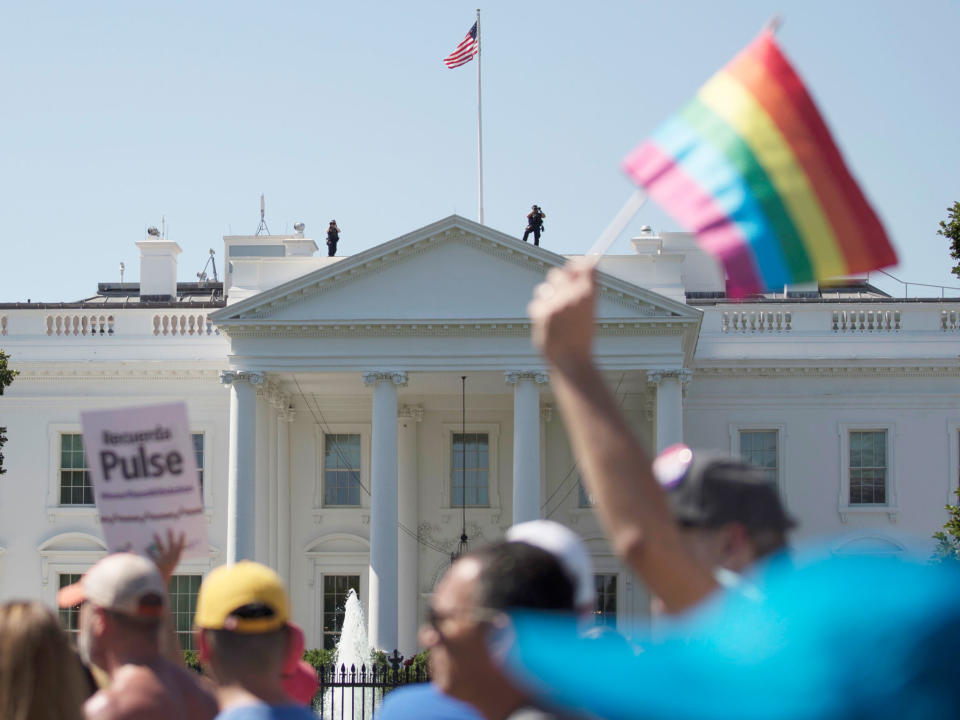Trump administration says Civil Rights Act should not stop LGBT discrimination by US employers

Donald Trump’s administration has said the US Civil Rights Act should not be used to stop employers discriminating against LGBT people.
The US Department of Justice (DOJ) has filed a 23-page brief claiming that Title VII of the 1964 act, which bans discrimination on the grounds of sex, should not be interpreted as applying to sexual orientation.
The document was released just hours after Mr Trump announced he was banning transgender people from serving in the US military.
“The sole question here is whether, as a matter of law, Title VII reaches sexual orientation discrimination,” the brief said. “It does not, as has been settled for decades.”
It continues: “As the courts have long held, discrimination based on sexual orientation does not fall within Title VII’s prohibition on sex discrimination because it does not involve disparate treatment of men and women.”
It was issued by two of Mr Trump’s Acting Assistant Attorneys General ahead of a court case relating to a now-deceased skydiving instructor, Donald Zarda, who claimed in 2010 that he was fired because of his sexual orientation after he disclosed it to a customer.
Mr Zarda died in a skydiving accident before the case went to trial but the executors of his estate have continued the lawsuit.
In April, a court ruled that Title VII does not forbid discrimination on the basis of sexual orientation. However, the ruling was appealed by an LGBT rights charity.
The interpretation of the law is unclear, particularly regarding how it applies to gay people. Transgender people are more likely to be covered by Title VII because it explicitly outlaws discrimination based on gender. Sexual orientation, however, is not mentioned.
While the US Equality Employment Opportunity Commission has said the law should be interpreted as covering sexual orientation, the Department for Justice insists it should not.
Surprisingly, the DOJ brief also appeared to challenge the idea that the Civil Rights Act covers discrimination against transgender people – something that has been generally accepted by US courts.
Sex discrimination should be interpreted as being against someone on the basis that they are “biologically male or female", it said, raising questions about how this would affect those who have transitioned.
Some judges have previously ruled that discrimination based on sex and sexual orientation cannot be easily differentiated because unfairly disadvantaging someone as a result of their sexual preferences is based on a stereotype of how their gender should behave. For example, a woman dating another woman would not be discriminated against on that basis if she was a man, and therefore the discrimination stems from the fact she is a woman.
The DOJ said the issue was not whether the law should ban discrimination on the grounds of sexual orientation but whether it is covered by the Civil Rights Act. Other US laws have prevented such discrimination “in various contexts”, it said.
The brief was filed just hours after Donald Trump announced that transgender people will not be allowed to serve in the US army.
Writing on Twitter, the US President said: “After consultation with my Generals and military experts, please be advised that the United States Government will not accept or allow transgender individuals to serve in any capacity in the U.S. Military.
“Our military must be focused on decisive and overwhelming victory and cannot be burdened with the tremendous medical costs and disruption that transgender in the military would entail. Thank you.”
The decision, which was widely criticised, will overturn a ruling by Barack Obama that transgender people should be allowed to openly serve in the military.
The White House was unable to say what would happen to transgender people already serving in the military.

 Yahoo News
Yahoo News 